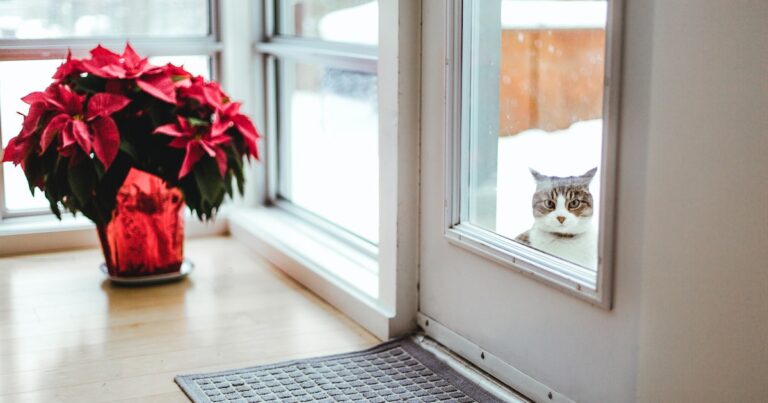
[ad_1]
You can’t go wrong with roses on Valentine’s Day or lilies on Easter. But when it comes to the end-of-year holidays, one flower reigns supreme: the festive poinsettia. The winter house plant makes a perfect centerpiece for dinner parties or a lovely gift. If you’re a pet owner, though, you might be wondering how safe the plants are for your furry family member. After all, your pets are no doubt a part of your home’s holiday cheer, and the last thing you want is for them to get sick from your yuletide decor. So, are poinsettias poisonous to cats and dogs? Well, yes — but don’t forbid these quintessential holiday flowers from entering the building just yet.
Dr. Paola Cuevas, a veterinarian, MVZ, and behaviorist with pangopets.com, tells Scary Mommy that it’s important to know that poinsettias (otherwise known as Euphorbia pulcherrima) are only mildly toxic to cats and dogs.
“This means that while they can cause some issues, it is unlikely an animal will die from exposure to their toxins,” she says. According to Cuevas, the plant’s sap contains diterpenoid euphorbol esters and saponin-like detergents, which are strong irritants to the skin. If a pet has chronic exposure to them, the substance could have a carcinogenic effect.
To learn more about the effects of poinsettias on your pets, read on for Cuevas’ advice.
What are the symptoms your dog has been poisoned by a poinsettia?
The poinsettia’s sap causes skin and eye irritation through contact, so Cuevas says swelling and itchiness of the dog’s skin are the usual signs of toxicity.
“If a dog has ingested this plant, it can cause drooling, lip licking, and irritation of the mouth, esophagus, and stomach lining,” she adds. “On rare occasions, this could also cause a dog to vomit or suffer from diarrhea.”
What are the symptoms that your cat has been poisoned by a poinsettia?
Similar to a dog’s experience with poinsettias, a cat will suffer skin and eye irritation through contact, says Cuevas. “The signs would be swelling and itchiness of the cat’s skin and the evidence of a destroyed poinsettia plant,” she explains.
Like a dog, if a cat has ingested a poinsettia, you’ll notice drooling, likely along with irritation of the mouth, esophagus, and stomach lining. And, like with dogs, your cat might vomit or suffer from diarrhea on rare occasions.
When should you call a vet?
Thankfully, Cuevas says the symptoms are very mild and self-limiting, so if your dog or cat eats a poinsettia, stay calm and keep a close eye on them. “The swelling, irritation, and gastrointestinal symptoms will pass,” she says. “Making sure that the pet is well hydrated is a good idea, and if the vomit and diarrhea persist for more than 24 hours, making a visit to the veterinarian is recommended.”
If your pet has been exposed to the plant and presents extreme irritation signs, she suggests some rinsing could help. “Just remember some pets are easier to handle than others and, when suffering pain and discomfort, pets are likely to bite, scratch, or hurt even their beloved human parents,” she says. “It is important to take the necessary precautions to protect yourself before attempting to handle the pet.”
To help facilitate rinsing, Cuevas recommends rolling cats in a towel and evaluating if the situation is really needed or if it is better to avoid the extra stress such handling will cause. Having a second person to assist might also be a good idea.
If you decide rinsing is necessary, you can take the following steps:
- Rinse the mouth out with water if leaves or stems were eaten.
- Rinse eyes with water, if needed.
- Wash the skin of any area that appears irritated with a soothing mild pet soap (she recommends Bayer’s Vetriderm) and water.
How to keep your poinsettia away from their pets?
Even if contact with poinsettia provides only a mild reaction from your pet, Cuevas says it’s a good idea to keep the plant away from your furry friends. “Making it physically impossible for your pets to reach the plant is the safest approach if your pets seem stubborn,” she says. “Placing the plant up high works for dogs. But in the case of a cat, your might need to take a different approach, such as placing them behind chicken wire.”
The good news is if your pets have had previous experience with a poinsettia, they most likely won’t go near the plant again. Better to be safe than sorry, though!
[ad_2]